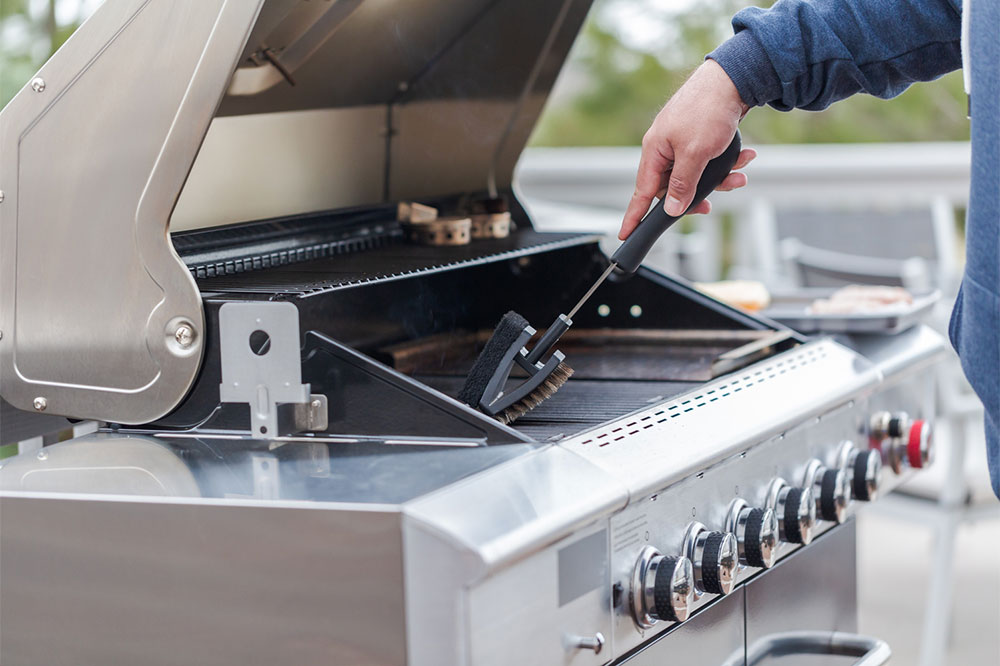10 Tips for Efficient Gas Grill Cooking
An outdoor party is incomplete without an open grill. People unwinding, chatting the entire evening, and grilling meat and veggies can make for the perfect garden party. Like other types of cooking, grilling is more art than science. Aside from a few fundamental guidelines, your talent and grilling style will determine how good you are at it. So, it is essential to know the nuances of gas grill cooking to avoid any unwelcome surprises.

Clean up your grill
Keeping the grill clean can lessen the likelihood of flare-ups and continuous smoke, which will scorch the food’s exterior and add a foul flavor. To remove any remaining grease or food particles from the grill grates, many people turn the grill on high for 10 to 15 minutes. However, not all grease is completely burned off during a high-temperature clean-up. Using a grill brush to remove stuck-on food forces the trash into the grill.
Prepare your grill
It is important to season and prepare your grill before using it for cooking. Seasoning only involves cleaning the grill’s grates; it has nothing to do with the flavor of the food. If your grill isn’t new, warm it up and brush it thoroughly to get rid of dust. Spray the grates evenly with a high-heat gas grill cooking spray while they are still cold before using your grill for the first time.
Once the oil starts to burn off, switch the grill to medium heat for about 15 minutes. Check the instructions for your grill to see whether your grates have a porcelain enamel coating that doesn’t need seasoning. This will save you time and effort. Season the grill before each gas grill cooking session to prevent rust from forming.
Control flare-ups
When it comes to fire, there are two key principles to remember: control the fire when you want to use it and battle it when you want to put it out. Flare-ups are a byproduct of a gas grill cooking fire and should be managed rather than suppressed. Always attempt to leave some space on your grill so you may relocate the food if there is a flare-up. When a flare-up does occur, move the food out of the path and leave the grill top-up to let it burn out. If the fire spreads, take everything off the grill and let the grease burn out as quickly as possible.
Keep moving the food around the grill
It is a common misconception that you shouldn’t move food while grilling. To reduce the chance of flare-ups and burning, moving the food items close to the grill is suggested. Flare-ups are extremely typical while using high-fat foods for gas grill cooking, so you don’t need to be concerned.
Have ample fuel
Have you ever had a grilling gas leak? While cooking, leaving the house to refill a gas tank is a major inconvenience. You won’t ever have to be concerned about running out of gas if you always have extra fuel on hand. So before you host that BBQ party, make sure you have ample fuel.
Lower the grill temperature for foods that contain sugar
Cookout favorites frequently include ribs covered in a delicious seasoning or barbecue chicken dripping with sauce. With sauces or rubs that contain sugar, there is a risk of scorching or blackening dishes since sugar burns fast. To avoid charring, keep your grill’s temperature below 265°F (130°C). This is comparable to “low and slow” barbecue, which may take much longer to cook yet almost always results in a successful meal.
Ensure food safety
Safe and hygienic grilling is essential; so always prepare keeping food safety in mind. Use different plates to take raw meat to the grill and when serving cooked meat. Consider using a meat thermometer to check temperatures while cooking proteins to a safe level of doneness. Maintain a clean and sterile environment during gas grill cooking to prevent cross-contamination.
Grease the grill
Nobody enjoys food that adheres to the grill. For this reason, you must use butter or oil to lubricate the grill. Spray oil on the griller rather than using a cloth that has been dipped in some oil. However, you don’t need to spray oil on the griller if you are grilling something that has already been smeared with oil.
Defrost the food items
You need to prepare precisely grilled foods in advance to add more flavor. To achieve the ideal texture, you must thaw food items that have been frozen and kept in the refrigerator. For this reason, remove the ingredients from the refrigerator at least 15-20 minutes before you begin grilling.
Get creative
You may always look online for recipe ideas if you typically grill steak and hamburgers. There are countless inventive and interesting recipes when it comes to gas grill cooking. Have you ever attempted to grill pizza? To grill something other than beef, pick up some whole-wheat dough at the grocery, preheat the grill to high, add some sauce and vegetables, and you’re good to go!